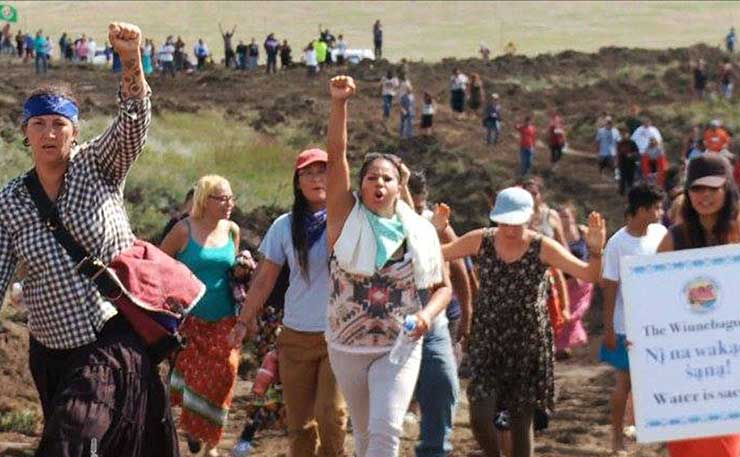Dr Liz Conor pays tribute to the resistance against the Dakota Access Pipeline, and Indigenous people the world over who are leading the fight for climate action.
In 1923, Iroquois chief Deskaheh travelled to Geneva to present the grievances of his Six Nations people. Although he was officially ignored, he brought about two seismic shifts on the world stage: He appealed to them as the representative of a sovereign domestic state, and in doing so he forged a shared global identification for all native peoples – Indigenous.
In the decades that followed, growing recognition of shared regimes of oppression in located struggles under the same structure of settler-colonialism (rather than unrelated events) deepened the transnational ties around Indigenous and First Nation as global identifications.
It galvanised around ‘loss of land and subsistence, abrogation of treaties, and the imposition of psychologically and socially destructive assimilation policies’. These classical presentations of what Patrick Wolfe famously called settler colonialism’s ‘logic of elimination’ are presently being enfolded into the resource conflicts that beset the extraction of fossil fuels.
In far-flung but linked sites, Indigenous peoples are fighting, yet again, for their very lives and the land that sustains them. Demands for collective rights to self-determination in international law are being led by increasingly forceful appeals to international bodies to act urgently on their particular exposure – climate change, from rising seas in the Pacific to coastal erosion and flooding in Alaskan villages.
In Australia we’ve seen antagonism between Indigenous ‘stakeholders’ and environmental campaigners, most bitterly over the Queensland Wild River legislation (2005, since repealed). Yet barnstorming alliances have also been formed through the perhaps indelicately named ‘Lock the Gate’ campaign opposing fracking in Gippsland and NSW, between farmers, environmentalists and Indigenous custodians. Lock the Gate is presently advising an Indigenous coalition in the NT on CSG campaigning.
Anti-racist solidarities are increasingly expressed around resource protection and climate change. Very different sovereignties – some summarily seized, others defended, both over centuries – are trying to find common ground under entirely new configurations of anti-racist solidarity.
For those of you who haven’t facebook-checked into the Standing Rock protest camp (with the million who did), the Dakota Access Pipeline is at the moment the foremost instance of alliances against incursion and misappropriation or destruction of Indigenous resources. Over 300 Native American Nations have now converged at the site near Sioux lands at Standing Rock Indian Reservation.
The camp is arguably distinct from the blockades of the environment movement, such as the Franklin River blockade in 1982 and the more recent sustained blockades at the Leard State Forest against the Maules Ck Coal mine. Standing Rock doesn’t identify as part of Naomi Klein’s climate Blockadia, nor do the activists wish to be identified as climate activists first and foremost. Rather their struggle is for water.
The Oceti Sakowin leading the obstruction of boring under the Missouri River and on their sacred land identify as Water Protectors moreso than climate protestors, but the links are drawn in Indigenous media bannered ‘CO2LONIALISM’. In their calls to action against this $3.8 billion, 1,200-mile pipeline which will transfer oil across several states and under America’s largest (Ogallala) Aquifier, they have asked global grassroots climate organizations to respect the protest at Standing Rock as Indigenous-led, and to take directives from them.

The resistance by the Oceti Sakowin and other Native American nations is primarily about heritage, water and sovereignty. So far this is largely respected by organisations as diverse as 350.org, Greenpeace, the Sierra Club and Friends of the Earth.
The erasure of Indigenous presence and agency in environmental struggles has been significantly challenged over the last decade. In amongst today’s coverage, historical continuities are being drawn, the genealogy of treaty perfidies are increasingly written in. The struggle is presented as a continuum of settler-colonial misappropriation and befouling of resources at Standing Rock. It tells us that settler-colonialism is ‘relentlessly active in the present’ and its tenets of expropriation violently enforced by increasingly militarized policing.
Water Protectors have been attacked by the National Guard with rubber bullets, tear gas, mace canisters and water cannons in freezing temperatures leading to dozens of cases of hypothermia. At time of writing, it isn’t clear whether Sophia Wilansky will lose her arm after police threw a concussion grenade directly at her during the face-off on the bridge on Sunday night. Razor wire has been laid on the banks of Cantapeta Creek. The camp is slated to be ‘cleared’ on December 5th.
Expressions of Indigenous pact with the Oceti Sakowin are pouring in from around the world. Australian Aboriginal climate organisations, such as the highly effective SEED (Indigenous youth climate network) and also Palestine artists have pledged support testifying to the global network of dispossessed linking from located sites of resistance.
Israa Suliman, a student and writer in Gaza, penned an open letter that accompanied a video featuring a number of Palestinian artists. She writes, “My ancestors were the indigenous people, just like you. And they suffered the same fate as your people. America’s policy of occupation and displacement through forced marches like the Trail of Tears, and the gradual transfer of so many of your people to massive, impoverished reservations, hurts me deeply because it is so similar to the ethnic cleansing of my ancestors by the Israeli military occupation in what we call al-Nakba (the catastrophe).”
Suliman notes that a large security corporation hired by the pipeline company profits from Israeli prisons. “Like you, we don’t control our natural resources,” Suliman writes. “Just as you were not consulted about the Dakota Access Pipeline that will traverse your land and contaminate your water supply if installed, we are not consulted by Israel, which wants to mine the gas supply in our harbor for its own use and monopolizes the water supply in the West Bank for the green lawns of its own residents – leaving Palestinians parched and dry.” Nor does she fail to draw a parallel to Palestinian expulsion, displacement and occupation, pointing to the five million Palestinian refugees in the global diaspora.
This resource deprivation is perpetrated by multinational fossil fuel conglomerates against Indigenous peoples who are simultaneously defending their homelands while carrying the can for the rest of us on the front line of the climate movement. We settlers owe them under new-yet-old sets of circumstances.
Anti-racist solidarities are changing before our eyes at the #NODAPL Standing Rock protest camp. Race formations are morphing into global Indigenous resistance networks. As Wolfe wrote in his essential read Traces of History, “To be effective, anti-racist solidarities should conjoin as wide a range of historical relationships as colonialism itself has created.”
As the well-worn tenets of settler-colonialism’s land and resource expropriation are rewritten because of its assault on the norms of climate our lives depend on, the resistance by those first and worst impacted – Indigenous peoples – has placed them on the front line, from where we must credit them as leading this struggle on behalf of the living.
We owe them, yet again.
Donate To New Matilda
New Matilda is a small, independent media outlet. We survive through reader contributions, and never losing a lawsuit. If you got something from this article, giving something back helps us to continue speaking truth to power. Every little bit counts.





